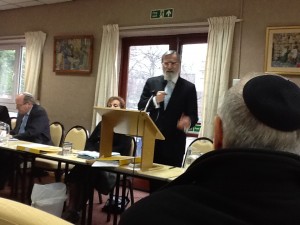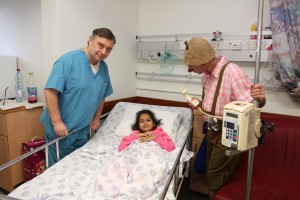I’m off topic.
 This morning I had the considerable privilege and pleasure to be entertained, because it was a performance when all is said and done, by Chief Rabbi, Lord Sacks at the plenary of the Jewish Representative Council of Manchester and Region.
This morning I had the considerable privilege and pleasure to be entertained, because it was a performance when all is said and done, by Chief Rabbi, Lord Sacks at the plenary of the Jewish Representative Council of Manchester and Region.
Lord Sacks was accompanied by Lady Sacks.
So entertained was I that I am moved to write a little something about Lord Sacks’ address.
Without notes and with disarming and engaging charm the Chief Rabbi took us through his achievements of 20 years in office. Indeed, with the very greatest respect to his predecessor, Lord Jacobowitz, it’s hard to remember a time when Jonathan Sacks was not Chief Rabbi. Indeed, the younger generation has grown up knowing only this one Chief Rabbi.
It is a little ironic that the proceeding began with Lord Sacks reading the opening prayer followed by the prayer for the Royal Famoly, a somewhat unusual event outside of a synagogue on Shabbat. Yet, this year and this month marks a milestone in the Queen’s reign and it was thought appropriate to read it. So who more apt than the Chief Rabbi whose reign, as it were, is also long and distinguished?
Unlike Her Majesty, Lord Sacks does not wish to carry on past retirement age. An amazingly youthful and trim Lord Sacks belies his years. However, when asked what he will do in his retirement he seemed a little non-plussed. He may be retiring from office but it’s not pipe and slippers for Dr Sacks.
In former times 65 seemed already pretty much old-age. Not now. Dr Sacks told us he had written 24 books and feels there are another 24 in him. His ‘retirement’ will be no such thing. In fact, he will work much harder teaching, writing, lecturing like an elder statesman.
When asked if he had any say in his successor the Chief Rabbi was adamant that not only does he not want anything to do with that choice but he believes it is wrong for him to have that choice. The next Chief should reinvent the role, not have to don the very large shoes left behind by the present incumbent.
Dr Sacks told us that at one time no-one really understood the role of the Chef Rabbi and there is in the office of the Chief Rabbinate a Victorian newspaper clip (I think it was if I recall accurately) which described the then Chief Rabbi as the ‘High Priest of the Jews’. Of course, he is no such thing, and the writer showed considerable ignorance of that role in Jewish history. Dr Sacks quipped that far from being the High Priest, he was more often the scapegoat that the High Priest would send into the desert in biblical times.
His best one-liner came as he was asked about his successor. He began his answer by referring to ‘he’ then said ‘I assume it will be a “he”‘, to much laughter from the audience.
The whole performance bespoke a man at the height of his powers, at ease with himself, grateful to the community and even, in a very unexpected and moving moment, grateful to his wife without whom, he said, ‘not a single day would have been possible’.
It all made me wonder why he is retiring, but then I realised that for a man like Jonathan Sacks, and he should live to 120, reaching 65 as he will shortly, must make him even more determined to fill his life with service and mitzvot, but just as importantly, to ensure to the best of his ability that the next generation of religious leaders are properly equipped to deal with the challenges of this century and not look back on or regress to the habits of the last.
Dr Sacks has been a Chief Rabbi covering the opening and closing decades of two centuries. I cannot imagine anyone remotely equalling his achievements and popularity, despite controversy and criticism.
I wish him and his wife, Elaine, well when they begin a new phase in their life next year.
Kol HaKovod, Yesher Koach vHatzlacha rabah.
Post Scriptum
Chief Rabbis featured in my early life; when I was about six I had a plastic canoe and inside were three Red Indians, one with a large headdress. When my mother asked me what the names of these three were I answered thus: “Chief Sitting Bull, Chief Geronimo..”, then coming to the third wearing the headdress, after a little pause “… Chief Rabbi”.
I was barmitzvah at St John’s Wood synagogue in London. As I rose to read my portion, facing me, either side of the Oren Kodesh were the Emeritus Chief Rabbi Israel Brodie and the incumbent Immanuel Jacobowitz.
You try doing your barmitzvah piece with two Chief Rabbis looking on!
